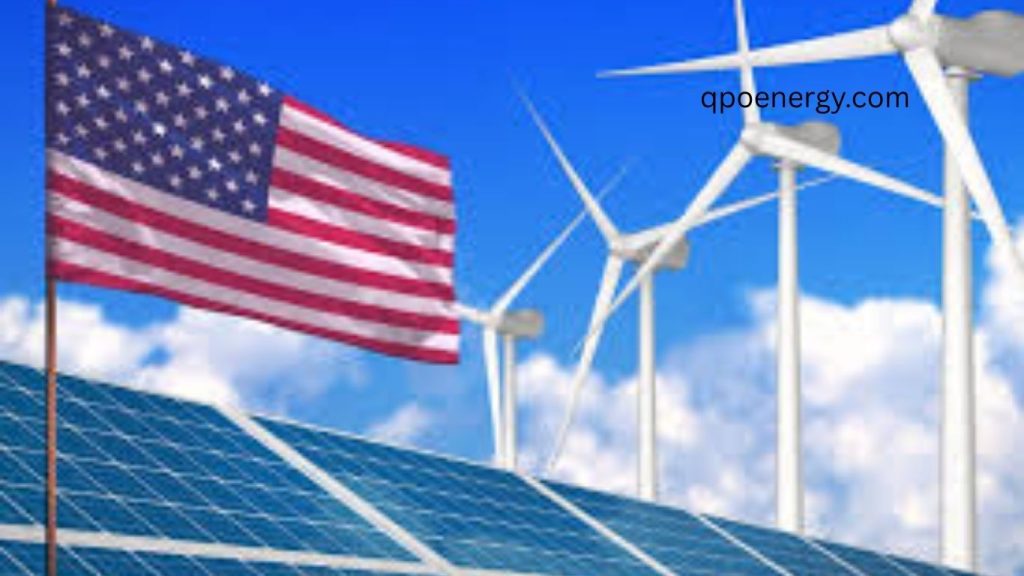Washington, Sept. 24 (Reuters) — The U.S. Department of Energy (DOE) announced plans to cancel over $13 billion in clean energy funds previously committed under the Biden administration. The decision, marking one of the most significant reversals of America’s renewable energy policy in recent years, has drawn strong reactions from across the political and environmental spectrum.
According to the DOE, the funds were initially set aside to support wind, solar, battery storage, and electric vehicle initiatives, all aimed at accelerating the nation’s transition to a low-carbon economy. However, the new administration has decided to redirect these resources, citing the need for fiscal responsibility and energy independence.
Read More: Determined Parents Eager to Tackle Climate Change Yet Struggling to Lead Low-Carbon Lives in 2025
A Shift Toward “Affordable and Reliable Energy”
In a formal statement, the department emphasized its commitment to ensuring affordable, reliable, and secure American energy while being “responsible stewards of taxpayer dollars.” Officials stated that returning the funds to taxpayers demonstrates the Trump administration’s intention to prioritize domestic energy production and reduce federal spending on climate-related programs.
This marks a sharp departure from the Biden administration’s aggressive climate agenda, which heavily subsidized renewable energy projects and electric vehicles to meet the U.S. target of achieving net-zero emissions by 2050.
Uncertainty Over Specific Cuts
While the Department of Energy confirmed the total amount being withdrawn, it did not specify which particular programs will lose funding. Requests for clarification went unanswered, leaving renewable energy developers, automakers, and state governments uncertain about which initiatives will be affected.
Industry experts believe the rollback could impact major incentive programs for clean energy infrastructure, battery innovation, and EV charging networks — all key elements of America’s green industrial policy.
Political and Environmental Fallout
The announcement immediately ignited political debate. California Governor Gavin Newsom — whose state has some of the world’s most ambitious climate targets — condemned the decision, calling it a step backward in America’s global energy leadership.
“By walking away from clean energy, the U.S. is ceding leadership to China,” Newsom warned. Speaking at a New York Times climate event, he criticized the administration’s stance, saying, “President Xi must be thrilled. I wouldn’t be surprised if he gives President Trump a bear hug when they meet.”
China currently dominates global manufacturing in solar panels, lithium-ion batteries, and electric vehicles — sectors that the U.S. has been trying to strengthen domestically through subsidies and incentives.
A Clash of Energy Philosophies
President Donald Trump, expected to meet with Chinese President Xi Jinping in the coming weeks, has repeatedly dismissed international climate efforts. In his United Nations General Assembly address earlier this week, Trump described climate change as “the greatest con job in history.”
He criticized what he sees as excessive spending on global environmental initiatives and multilateral institutions, arguing they deliver little tangible benefit for ordinary Americans. “We’ve seen billions wasted while families struggle with rising energy prices,” he said, reinforcing his long-held skepticism of climate science and international climate accords.
Fossil Fuels Take Center Stage Again
Since returning to office in January, Trump has championed domestic oil and gas production, already at record levels, while systematically reducing subsidies for renewable technologies. His administration argues that fossil fuels remain essential to national security, job creation, and affordable energy.
Energy Secretary Chris Wright echoed these sentiments during a press conference in New York, confirming the planned funding cuts. He claimed that international organizations and climate activists have “exaggerated” the threat of global warming, driving “massive amounts of spending with minimal positive impact.”
“The President believes we’ve lost perspective,” Wright stated. “Our energy policy must focus on what truly benefits the American people — affordability, reliability, and strength.”
Job Growth at Stake
Despite the administration’s rationale, critics warn that the rollback could have severe economic consequences. A recent E2 (Environmental Entrepreneurs) report revealed that clean energy jobs grew three times faster than the overall U.S. workforce in 2024. The study emphasized that renewable energy industries — including solar, wind, and battery manufacturing — have become major engines of job creation, especially in rural and midwestern states.
Advocates fear that canceling billions in funding will lead to mass layoffs, reduced innovation, and slower progress toward decarbonization. “These aren’t just environmental jobs — they’re economic lifelines for thousands of American families,” said E2 spokesperson Maria Lopez.
California’s Determined Response
Governor Newsom reiterated that California will continue advancing its clean energy goals regardless of federal policy changes. The state remains committed to reaching 100% clean electricity by 2045 and cutting greenhouse gas emissions 85% below 1990 levels.
“California won’t back down,” Newsom declared. “We’ll keep investing in solar, wind, and electric vehicles because the future of our planet — and our economy — depends on it.”
Several other states, including New York, Washington, and Massachusetts, have signaled similar intentions to maintain or expand renewable energy programs using state-level incentives and partnerships with private investors.
Global Reactions and Market Impact
International observers say the U.S. policy reversal could undermine global climate cooperation ahead of the United Nations Climate Conference (COP) in Brazil this November. Many nations view American participation as critical to sustaining global climate finance and innovation.
Analysts also predict short-term volatility in renewable energy markets, particularly in solar and EV sectors, as investors reassess federal support levels. “The policy shift injects uncertainty into long-term planning,” said energy economist Daniel Reid. “Developers depend on predictable funding cycles to manage multi-billion-dollar projects.”
Energy Secretary Declines to Attend COP Talks
When asked about attending the upcoming UN climate talks, Secretary Wright said he has no plans to participate, though he didn’t rule it out completely. “I enjoy open discussions about energy and climate with people who see things differently,” he noted. “Nothing is impossible.”
His remarks reflect the administration’s growing distance from global climate diplomacy, which many interpret as part of a broader push for energy nationalism.
The Bigger Picture: America at a Crossroads
The decision to cancel $13 billion in clean energy funding underscores the deep divide in U.S. energy policy. Supporters see it as a move toward fiscal discipline and national sovereignty, while critics warn it could set back climate progress by years and weaken America’s position in the global energy race.
The contrast between state-level ambitions and federal rollbacks highlights a growing fragmentation in U.S. climate leadership. As renewable energy becomes increasingly profitable worldwide, analysts caution that the U.S. risks losing technological and economic competitiveness to nations that continue to invest aggressively in clean power.
Still, proponents of the decision argue that redirecting funds could lower federal debt and strengthen traditional energy sectors, potentially stabilizing the economy during uncertain times.
Frequently Asked Questions:
Why is the U.S. government canceling $13 billion in green energy funds?
The U.S. Department of Energy announced plans to withdraw over $13 billion in funds previously allocated for renewable energy projects. The administration stated the move aims to promote affordable, reliable, and secure domestic energy while ensuring fiscal responsibility with taxpayer money.
Which programs are affected by the funding cuts?
The Department of Energy has not yet specified which programs will lose funding. However, experts believe the cuts may impact federal subsidies for wind, solar, electric vehicles (EVs), and battery innovation initiatives across several states.
How have political leaders responded to this decision?
California Governor Gavin Newsom strongly criticized the cuts, arguing that the U.S. is surrendering clean energy leadership to China. Supporters of the move, however, say it reflects a pragmatic shift toward energy independence and cost control.
What impact could this decision have on the renewable energy industry?
Analysts warn the funding withdrawal could slow renewable energy growth, reduce job opportunities, and discourage private investment. A 2024 report showed clean energy jobs were growing three times faster than the national average, meaning the cuts could lead to significant workforce losses.
How does this affect America’s global climate leadership?
The decision has raised concerns about the U.S. stepping back from its climate commitments, potentially weakening its influence in international environmental negotiations and allowing competitors like China to dominate the global renewable energy market.
What are the long-term implications of canceling clean energy funds?
In the long term, this policy shift could alter the direction of U.S. energy strategy — reinforcing fossil fuel dependence while slowing innovation in green technologies. It may also increase tension between federal and state governments pursuing independent climate goals.
Will this affect international climate talks?
Yes. The Energy Secretary has indicated no immediate plans to attend the upcoming UN Climate Conference in Brazil, signaling a reduced U.S. role in global climate cooperation and potentially undermining international climate finance commitments.
Conclusion
The U.S. government’s decision to cancel $13 billion in green energy funding has sparked widespread concern, reigniting debates over the nation’s climate priorities, economic future, and global leadership. Supporters see the move as a step toward fiscal prudence and energy security, while critics warn it undermines years of progress in renewable innovation and environmental stewardship. This funding rollback arrives at a pivotal moment when clean energy technologies are rapidly advancing worldwide. By stepping back from large-scale federal investment, the U.S. risks losing its competitive edge to countries like China that continue to dominate solar, battery, and EV markets.


